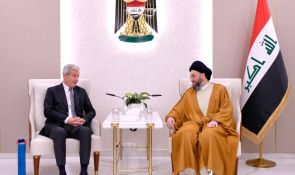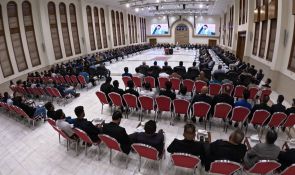Sayyid Al-Hakeem: food and drink become reprehensible and prohibited when they cause spiritual and moral harm
In his Ramadan lecture on 17/3/2024, Sayyid Ammar Al-Hakeem, Head of Al-Hikma National Movement, continued his discussion on the Message of Rights for Imam Zain Al-Abidin (peace be upon him), which encapsulates the social theory of the rights system in Islam. Previously, His Eminence discussed the eighth right, which is the right of the stomach, and the insights provided in this Islamic message about this right. H.E. reviewed the linguistic meaning of the stomach in the first insight and in the second insight, he examined the Quranic verses indicating that eating and drinking are indeed blessings from Allah.
In the third insight, H.E. discussed the moral dimension of food and drink, emphasizing that the ethical value lies in optional matters, while the necessity of food and drink for human survival falls outside of choice. H.E. further explained that what has moral value and is deemed good or bad in consuming food and drink includes its quantity, type, manner of consumption, and timing, with these details encompassing dining etiquette.
H.E. differentiated between commendable and reprehensible aspects of consuming food and drink: what exceeds the necessity is condemned, as mentioned in Surah Al-A'raf, verse 31, "Eat and drink, but do not waste. Surely He does not like the wasteful." (07:31 Holy Quran), Imam Sajjad (peace be upon him) emphasized: “To moderate in lawful consumption and cautioned against extravagance away from need causes humiliation and lack of generosity.
Moreover, if food and drink lead to physical or material harm, they become reprehensible, such as when certain foods harm an ill person.
Additionally, food and drink become repugnant and forbidden when they cause spiritual and moral harm, like consuming intoxicants to impair one's intellect, eating pork, or consuming non-halal meat.
Furthermore, food may become repugnant and forbidden at times when it is used to commit forbidden acts, but it becomes commendable when it is used for goodness or obedience, such as eating at dawn for the purpose of fasting. It also becomes commendable when its intention is to bring joy to the heart of a believer by inviting them as a guest and wishing for them to partake of one's food.
H.E. clarified that the Quran presents a general principle regarding the adornment and prohibition of food, as mentioned in Surah Al-A'raf, verse 157, "Permits for them what is lawful1 and forbids to them what is impure2, " (07:157 Holy Quran) Here, 1lawful refers to what pleases a person, with no specific indication of its prohibition, while 2Impure refers to what disgusts a person and causes aversion.










